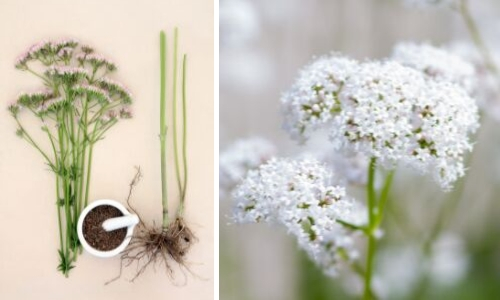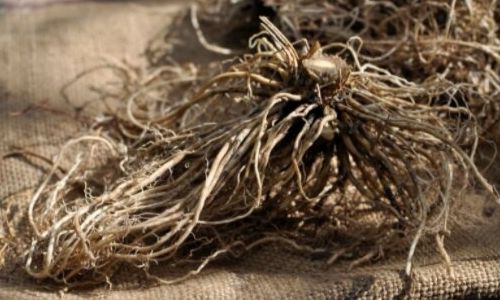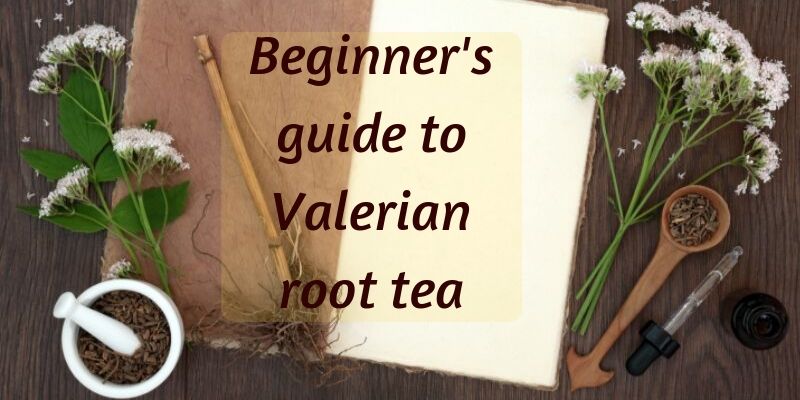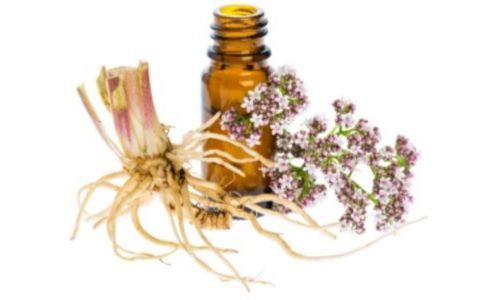Valerian root tea is one of the most powerful bedtime teas out there, and if you're suffering from anxiety attacks or large amounts of stress, it may become a good friend of yours.
I made this beginner's guide to valerian root tea since it's a bit of a sensitive topic. Some advocate against this herb, while others praise it for the relaxation it brought into their lives.
Not a very well understood plant, so let's sit down and talk about it at length, and run over the health benefits and side effects as well.
Table of Contents
What is valerian root tea ?
Valerian root tea, or simply valerian tea, is a brew/infusion made from the dried or fresh roots of the valerian plant.
It's a fairly effective sedative, and is usually taken in cases of insomnia, anxiety, or during periods of high stress (like work or school). You'll find it on shelves as a bedtime tea, and maybe a few rows further you'll find powdered valerian root, and next to it valerian root extract.
Valerian root tea is a very old tea, like most herbal teas in fact. It's been known to induce relaxation and relieve anxiety for several centuries, and was used extensively.
This herbal tea is also caffeine free, which makes it even better for drinking right before bed.
Where does valerian grow ?
Valerian is native to Europe and Asia, but may be grown in other parts of the world as greenhouses allow.
Being native to Europe, it was very much used throughout Britain, continental Europe, and Scandinavia. It appears in older documents and is mentioned by Hippocrates as a calming and sleep aid.
Valerian has been known to grow in Asia as well, particularly China (or at least, that's where it was recorded), and somewhere in the past has been planted in South and North America as well.
Do keep in mind that there's about 200 subspecies and variations of the valerian plant, but what we're discussing today and using in teas and tinctures is known medically as Valeriana officinalis.
You can grow your own valerian, most probably right in your backyard. There are quite a few articles on how to grow it at home, and how beneficial it is to other plants in the garden.
What does valerian look like ?
Valerian is a tall flowering plant, reaching as much as 6 full feet (1.82 m), with many thin but sturdy stems, and small white flowers.
The most important part of the valerian plant is the root itself, which what is used for teas, tinctures, ancient sleeping potions, valerian baths, and general brewing.

Right - close-up of valerian flowers, can sometimes be pinkish.
Can you use leaves or fresh root for valerian tea ?
As explained by Henriette (owner of a very helpful and thorough herbal guide), the best part to use is the root, the other parts above ground are much weaker. Flowers can be used as well, but again will be weaker than the root.
And the dried root is always stronger than fresh root, so make sure you get your hands on dried valerian root, otherwise it won't be as strong.
Or, if you've got fresh valerian growing in your garden, make sure to dry the root before use.
How to make valerian root tea
Making your own cup of valerian root tea will be easy enough, since this is a herbal tea and will not get bitter if you steep it for too long. Neither does it have any special instructions.
I recommend you use loose dried root, as opposed to teabags. This is mostly because the teabags are a little dim in their effects. However if you use a teabag, it might comes as part of a bedtime tea blend, or some other blend intended to promote relaxation.
As a result it might be just as strong because it used another herb in conjunction with valerian - like chamomile or lavender - or it might just not smell as awful as full-on valerian.
So, for a cup of valerian tea, you'll need:
- 9 oz/266 ml hot water (90 C/194 F)
- 1 heaping teaspoon of loose dried valerian root
- OR a valerian root teabag
- tea mug to keep the tea
- kettle or pot to heat the water
- strainer or filter to separate the valerian from the tea
About the amount of water to use, I recommend you use 9 full oz/266 ml of water because about a whole ounce/33 ml will be absorbed by the dried valerian root, and you'll end up about 8 oz/236 ml of actual, brewed tea.
So make sure you bring your water up to boil, either on the stove or in an electric kettle. This makes sure your water is evenly heated, and makes the whole process easier to stop when you please.
After your water's been brought to boiling point, turn the heat off, and take the water off the heat. Let it sit to cool down for 2 full minutes, so it gets to about 90 C/194 F.
No tea, not even herbal tea, should ever be made with boiling 100 C/212 F water. You get a very poor tasting brew that way, and scald the plant as well.
Once the water is at the right temperature, add it to the valerian, or the valerian to it, however you please. The best method seems to be simply steeping the tea in the tea mug you're going to drink from in the first place.
For this, Sweese has a nice little tea mug that comes with a metal filter and porcelain lid. Okay, the mug is not very little, it's actually larger, about 15 oz/440 ml.
The mug is porcelain as well, and the metal filter is stainless steel. You simply need to insert the filter into the mug along with the tea or teabags, and steep with the filter in. Once you're done, remove the filter and you're ready to drink.
You can check the listing on Amazon for this mug, and read the reviews as well.
What does valerian tea taste like ?
You might've heard about valerian root before, and if so then you've definitely heard it stinks. Boy does it crack your nose.
But what about taste ? Well, I'll be honest with you, valerian doesn't taste all that great. It tastes less bad than it smells, but it's still not a flavor many people readily embrace.
It's tolerable, and after a few sips you can almost ignore it, especially if you sweeten it a little, or add half a slice of lemon to lighten things up.
If I had to describe the taste of valerian, I'd say it tastes a bit sweet, but a sickly kind of sweet, and reminds me of an unhappy cross between chamomile and lavender.
You know how lavender can be just too strong ? That, plus a very herbal tone.
If valerian root tea sounds like a good idea so far, you can give ti a shot. It's best used as a longer term treatment (2-3 weeks), though I've used it for 203 days and slept well even like that.
So I recommend you give loose valerian root (dried) a chance, and get that over the pre-made teabags. For example this bulk bag from Frontier offers you 16 oz/400 gr of dried, cut, and sifted valerian root.
It comes in a sealed bag, and I suggest you get yourself some airtight containers to keep the valerian once you've opened the bag, as it can't be sealed back.
I've had teabags that made my entire kitchen smell, just a heads up.
I'm recommending this bulk bag and not a box of teabags because it's actually a steal. For how much valerian root you get, and how many uses - you can even grind it into powder and make it into capsules - it's a very nice price.
You can check the listing on Amazon here, and read the reviews as well.
Why does valerian root smell ?
I mentioned the smell. Well, valerian root does smell, as do the flowers, but we rarely end up smelling the flowers themselves.
The roots are what we commonly use in teas and thus what we usually end up smelling.
There's no way around it, valerian root smells like meat going bad, feet, or some varieties of aged cheese. For me the smells is very reminiscent of the proteins in milk breaking down, after it's been left in a warm place for a couple of days.
That being said, there is a definite herbal note to it, resembling hay for example, which might make it tolerable for some people. And as with anything you're exposed to for a long time, you'll develop a tolerance tot he smell and end up associating it with drowsiness.
But why does valerian smell ? No one's really got an answer to that, aside that it contains valerenic acid, which smells that way by nature.
Apparently valerian and its strong smell have been just accepted since ancient times, and there's not much info on why it smells.
This means that any form of valerian you will find - tincture, essential oil, dried root, tea, capsules, powder form, anything - will have a strong smell.
Cats seem to love the smell of valerian though, since it's very similar to the pheromones cats give out when they're ready to mate. So, maybe don't give valerian to your cat ?
Valerian tea health benefits and side effects
There are definite health benefits to valerian root tea, as well as some possible side effects. Most of them have to do with the calming qualities valerian has on our bodies, and sometimes that can go too far if valerian root is taken in large amounts.
Can you drink valerian tea every night ?
For a time, yes, you could drink valerian tea every night. Prolonged exposure to valerian gives you a higher tolerance, which may mean you'll have to up the dosage, which is not something you should be doing, as this is a mild sedative we're talking about.
Having said this, no one really agrees on exactly how long you should take valerian for. Most doctors recommend you don't go past 3 weeks back to back, while others insist on 6-7 weeks of continuous treatment (albeit in smaller doses).
Valerian can take a while to have the desired effect on some people. Some react immediately and become relaxed, sleepy, calm.
Others, like those battling severe stress and chronic insomnia usually need the longer treatments. But in those cases I recommend you follow the instructions your doctor gives you about how long to take valerian.
In short, if you're an average Joe, with no severe anxiety, insomnia, or stress, a cup of valerian tea every night for a couple weeks is probably fine, as long as you stop once you've got the desired effect.
Valerian tea for sleep
Sleep and sleep related troubles are probably the most common reasons people drink valerian tea. Not only is herbal tea (due to the lack of caffeine) a great sleep aid, but valerian tea is especially great at relaxing the mind and the body.
Why does valerian work so well for sleep and relaxation ? Because its M.O. is very much like a benzodiazepine (such as Valium), with a couple of differences.
Valerian is very useful in this respect, and has proven to be effective at aiding sleep, usually if taken in concentrations up to 1 gram per day (such as powdered root in capsules).
Most studies have been done on valerian in capsule form, which is a bit stronger than the steeped tea from the dried root. However, the effects are of the same type, only possibly on a smaller scale.
I used to take valerian for sleep in high school, and at times in college, because I'd have this knack of staying up much too late, considering I had to be up early the next day.
What I can tell you about valerian is that I sometimes woke up very groggy, when I'd taken too much. Not saying it will happen to you, just pointing out my experience.
Valerian tea for anxiety and stress

The second reason people take valerian is to reduce stress response, and anxiety. This is again due to its similarity to Valium and other sedatives, helping to relax the body, and thus the mind.
It comes as a sort of companion effect to the sleep aid, since you can't fall asleep if you're continuously worried about this or that.
When drinking valerian tea for anxiety or stress, you should be drinking it during the day, but in a smaller concentration, Or, just one cup, so it won't hinder your day-to-day activities.
Valerian tea and pregnancy
Valerian tea isn't very well studied when it comes to pregnant women, however the studies we do have say that it may hinder the baby's brain development in a small way (zinc deficiency). Granted, this research was done on lab mice, but it's a definite find.
Also, since valerian is a mild sedative, it will induce drowsiness, sleepiness, and general low energy on your part as an expectant mother, which is not a good thing. As a pregnant lady you need your energy.
So I would day one cup every other day would be alright, as long as you don't overdo it or drink it for months on end. These are just my two cents, keep in mind I am not a medic or a licensed herbalist.
You can follow my advice or completely ignore it, it's up to you. If you're unsure, speak to your medic and ask him which herbal teas are safe for you and the baby during pregnancy.
Valerian tea side effects
There are some side effects to drinking valerian tea continuously. These mostly happen when you've been drinking large amounts of this tea, for prolonged periods of time.
So something like 4 cups a day for 3 weeks, which is not something many people do, but I'm sure there's a few out there.
Valerian's side effects include drowsiness, sluggish responses to stimuli, groggy when waking up, lethargy.
In more extreme cases it can lead to dizziness, low blood pressure, and possible stomach aches or headaches.
This is why when taking valerian, whether as tea or extract or capsules, you should not drive or handle heavy machinery, or do anything that requires sharp reflexes.
And of course, make sure to not take valerian along with alcohol. Or in conjunction with any medication meant for anxiety, stress, or depression.
For some people, valerian works completely differently. Even if they were to take a small amount of valerian, it would give them energy, make them restless, much like a caffeine overdose.
Other than these, there aren't many other known side effects of valerian.
Conclusion
Valerian tea is a wonderful aid for sleep and anxiety, but you need to be careful about it. It's why some people have trouble understanding it, and maybe overreact when hearing you're drinking valerian tea or taking valerian capsules.
As long as you're responsible, and also check with your doctor if you have any questions, you should be fine. if you doctor is unavailable, a pharmacist should be able to help as well.
The tea itself a a very strong smelling and tasting tea, so blending it with other herbs to alleviate the flavor or scent might be a good idea.
If you want to know more about coffee or tea, feel free to check the related articles below. Who knows what else you might find ?








